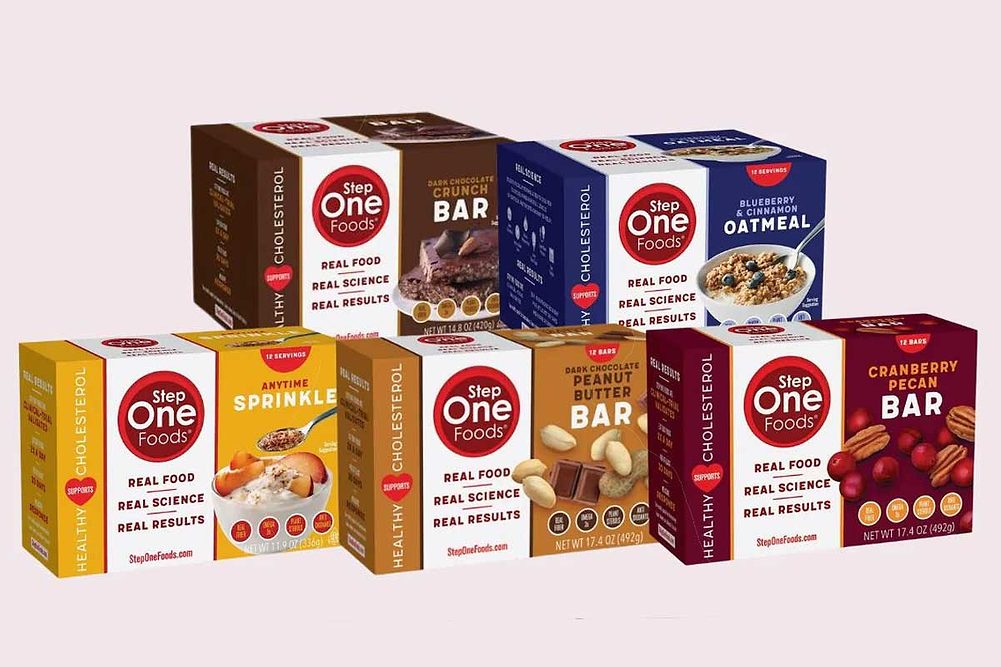MINNEAPOLIS — A Mayo Clinic- and John Hopkins-trained physician is challenging the medical system’s approach to preventive cardiology. Elizabeth Klodas, MD, hopes to one day put herself out of work with Step One Foods, a brand of meals and snacks designed to improve heart health.
The Minnesota-based cardiologist spent two decades treating patients for issues like high cholesterol, high blood pressure and high blood sugar before launching the business in 2007.
“I came to realize I wasn’t curing anybody,” she said. “No matter how many drugs I prescribed, no matter how perfect I got people’s numbers, no one looked any better and no one felt any better. In fact, a lot of patients told me all the medications made them feel worse.”
Pharmaceuticals improve downstream symptoms like high cholesterol or high blood pressure without addressing their root cause, she said. She compared it to covering a damaged wall with wallpaper. It may look better, but the underlying structure isn’t stronger.
“A condition like high cholesterol isn’t caused by a deficiency of Lipitor, but that’s how we treat it,” Dr. Klodas said. “It’s caused by a deficiency of the right foods.”
She embarked on a crusade to reframe cardiovascular treatment, encouraging people to adopt healthier eating habits and directing them to dietitians. A handful of patients found success with diet-based interventions.
“The problem was that it was too difficult for most people,” Dr. Klodas said. “Addressing a health condition like high cholesterol is about more than ‘eating better.’ You have to know what you’re doing.”
Those insights sparked Step One’s nutrition-based approach to improving heart health, which aims to make eating the right foods as easy as taking medication. Instead of pills, users consume two servings of Step One products daily.
The formulations deliver four “heart health building blocks” in convenient formats like oatmeal, smoothies, pancakes and snack bars. Fiber from oat bran, flaxseed and dried fruit binds to cholesterol particles in the intestine and removes them from the body. Plant sterols found in nuts and seeds block cholesterol absorption in the digestive track. Antioxidants from dark chocolate, berries and pecan prevent plaque from building up in blood vessels, while omega-3 fatty acids from chia seeds, walnuts and flaxseeds reduce inflammation and lower triglycerides.
The products were put to the test with a double-blind study conducted at Mayo Clinic and the University of Manitoba, undergoing the same level of scientific scrutiny typically reserved for pharmaceuticals. Participants followed the Step One program without changing anything else about their diet or lifestyle. After 30 days, Step One had reduced low-density lipoprotein (LDL), or “bad cholesterol,” by an average of 9% across participants. Overall cholesterol declined 5%.
 Source: Step One Foods
Source: Step One Foods“From a population health perspective, if we lowered the average LDL of the population by 9%, we would finally dethrone heart disease as the No. 1 killer of Americans,” Dr. Klodas said.
Bill Alldredge, co-founder at Step One Foods, estimated the company has helped improve hearth health and reduce the risk of cardiovascular events for 25,000 people.
“We’ve seen substantial growth,” he said. “Last year, we grew 250% in sales, despite all of the supply chain issues everyone had.”
A recent study published in the Journal of the American College of Cardiology found that between 2025 and 2060, the number of Americans with type 2 diabetes will increase 40% to 55 million. High cholesterol rates are expected to jump 30% to 126 million, and hypertension rates will increase 25% to 162 million. As a result, researchers predicted heart failure and heart disease in general will grow by a third. The common denominator is obesity.
“Everybody wants to solve their health issues in a way that does not require pharmaceuticals,” Dr. Klodas said. “There’s a real opportunity here because all of these conditions are caused in part or in whole by food.”





